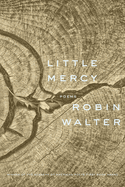
In poet Robin Walter's refined debut collection, Little Mercy, nature and language are saving graces.
Many of Walter's poems are as economical as haiku. "Lilies" entrances with its brief lines, alliteration, and sibilance: "Come/ dark, white/ petals// pull/close// --small fists// of night--." A poem's title often leads directly into the text: "Here" continues "the body, yes,/ sometimes// a river--little/ mercy." Vocabulary and imagery reverberate, as the blessings of morning sunshine and a snow-covered meadow salve an unquiet soul ("how often, really, I want/ to end my life").
Frequent dashes suggest affinity with Emily Dickinson, whose trademark themes of loss, nature, and loneliness are ubiquitous here, too. Vistas of the American West are a backdrop for pronghorn antelope, timothy grass, and especially the wrens nesting in Walter's porch. Animals are also seen in peril sometimes: the family dog her father kicked in anger or a roadkilled fox she encounters. Despite the occasional fragility of the natural world, the speaker is "held by" it and granted "kinship" with its creatures. (How appropriate, she writes, that her mother named her for a bird.)
The collection skillfully illustrates how language arises from nature ("while picking raspberries/ yesterday I wanted to hold in my head// the delicious names of the things I saw/ so as to fold them into a poem later"--a lovely internal rhyme) and becomes a memorial: "Here, on earth,/ we honor our dead// by holding their names/ gentle in our hollow mouths--." This poised, place-saturated collection illuminates life's little mercies. --Rebecca Foster, freelance reviewer, proofreader and blogger at Bookish Beck

